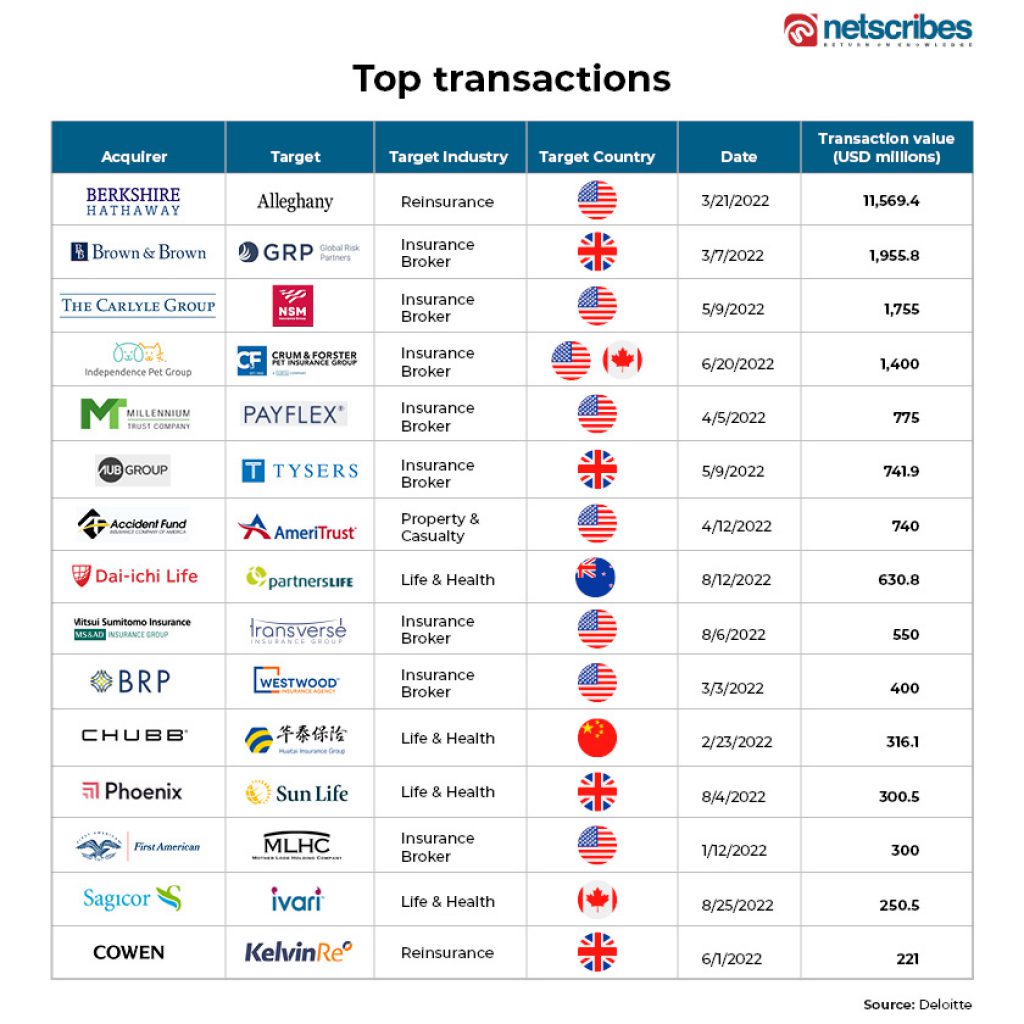The pandemic has created a great deal of uncertainty in the global economy, and many businesses are looking for ways to reduce risk and increase stability. For insurance companies, mergers and acquisitions (M&A) may provide a way to achieve these goals by diversifying their portfolios, reducing overhead costs, and increasing their market share.
Research shows that mergers and acquisitions or M&As in the global insurance industry reached their peak growth rate in ten years in the first half of 2022. Last year also observed a positive sentiment, especially amid geopolitical uncertainty, increasing interest rates, and inflation. There were 242 deals completed worldwide in the first half, up from 221 in the second half of 2021 and 197 at the same time last year.
Region-wise view of the insurance M&A industry
Americas had the highest number of M&As recorded as they posted 132 transactions – the highest number in 10 years – up from 108 in H2 2021. The number was driven by significant deal activity in the US. After strong growth in H2 2021, the number of deals in Europe dropped to 67 in H1 2022 from 74 in the previous six months. The UK was the most active country for M&A, followed by France, the Netherlands, and Spain.
Deal activity in the Middle East and Africa rose in the first half after a dip in 2021, with 16 deals, compared to 12 in the second half of last year. Most acquirers in this half were from Africa – four from the Ivory Coast, three from South Africa, and two from Kenya. The number of deals in Asia Pacific rose slightly to 27, from 24 in H2 2021. Japan was the lead acquirer in the region, followed by Australia.

Note: Data compiled December 14, 2022. Analysis includes insurance underwriter and Insurance broker deals announced between January 1, 2018 and November 30, 2022 that disclosed transaction values greater than $200 million and had an actual acquirer, target or seller based in the US, Canada or Bermuda. Excludes terminated deals.
Gaining interest from private equity buyers
Deloitte has predicted strong growth for the insurance sector in the US and Bermuda because of sufficient existing capital, a reassuring stock market, and few expected economic, regulatory, or tax obstacles. This market growth in the background of insurance M&As in 2022 will attract private equity firms to invest in the insurance sector in the hopes of gaining financial traction. Private equity interest in the insurance sector has become more robust, particularly with respect to the broker space. PE investment has also concentrated on the carrier space in chosen areas, including investments in Lloyd’s.
“The recent property/casualty (P&C) sector rate hardening has sharpened private equity interest in pursuing select opportunities in the commercial P&C sector, particularly the specialty segment, as it is expected to experience the biggest uptick in pricing,” Deloitte said. “This is likely to drive this space at a pace we have not seen previously, although it is unclear how this may change if interest rates go up.”
Deloitte’s analysis stated that in 2021 there were 802 insurance brokers in the US and Bermuda which represented a 45% year-on-year growth. The cumulative deal value was up 170% to USD 10.9bn, which surpassed the 10-year standard.
“In the face of stark economic pressures – inflation, rising energy costs, and looming recession – insurers remain focused on growth opportunities,” said Eva-Maria Barbosa, partner at Clyde & Co in Munich. “Several factors are driving reals. Rising interest rates promise better investment returns for long-duration businesses, while helping insurers to rebalance portfolios. Private equity firms and asset managers are still keen to explore either entry into the insurance market or expansion of existing footprints. And flagging insurtech valuations mean acquisitions are increasingly attractive to both PE investors and traditional carriers seeking to increase technological capabilities.”
Though the deal activity slackened in the first half of 2022 due to the overall economic situation, the deal activity is forecasted to bounce back in the second half of the year propelled by strong attention from PE-backed buyers. Looking at the growth of the overall insurance sector, the life and long duration property and casualty businesses that have struggled to make investment returns in a low interest rate setting may be able to rebalance portfolios and produce more justifiable revenues, making the specific sector more enticing for acquisition. Analyst reports by top auditing firms also predict that sectors like insurtech will have to collaborate with traditional carriers to have healthy growth.
Spurt in digitalization
Recent trends in digitization include improvement in cybersecurity, modernizing the existing technology platform, and improving customer experience. The insurers and brokers will hold onto digitization to improve expense competencies within their organizations.
Building an M&A strategy for future
Private equity firms and asset managers are continuing to discover prospects to enter or increase their impression in the insurance market, from distribution to underwriting and beyond. However, carriers have shown some skepticism as the industry faces low investment returns, supply chain problems, and chances of a probable recession. In times of economic uncertainty, there may be prospects to purchase individuals that were otherwise priced at a high rate or enter into partnerships that were not likely in recent history as certain potential partners seek to broaden their gap to increase finances.
Although geopolitical uncertainty and unstable equity markets may momentarily pause activity as valuations get revisited, in the background of the 2022 insurance M&A landscape, competition amidst insurance carriers will be high as private equity companies and asset managers consider growing their assets under management.
The insurance industry is undergoing rapid changes with new players entering the market and consumer expectations evolving every day. At Netscribes, we understand the need to stay ahead of the competition, which is why we provide the latest market data and insights to help firms make informed decisions. Our competitive intelligence and in-depth market research services and analysis cater to your unique needs and keep you ahead of the game. Contact us.
Based on insights by Chahat Khatter, Manager, Research and Information, BFSI.






